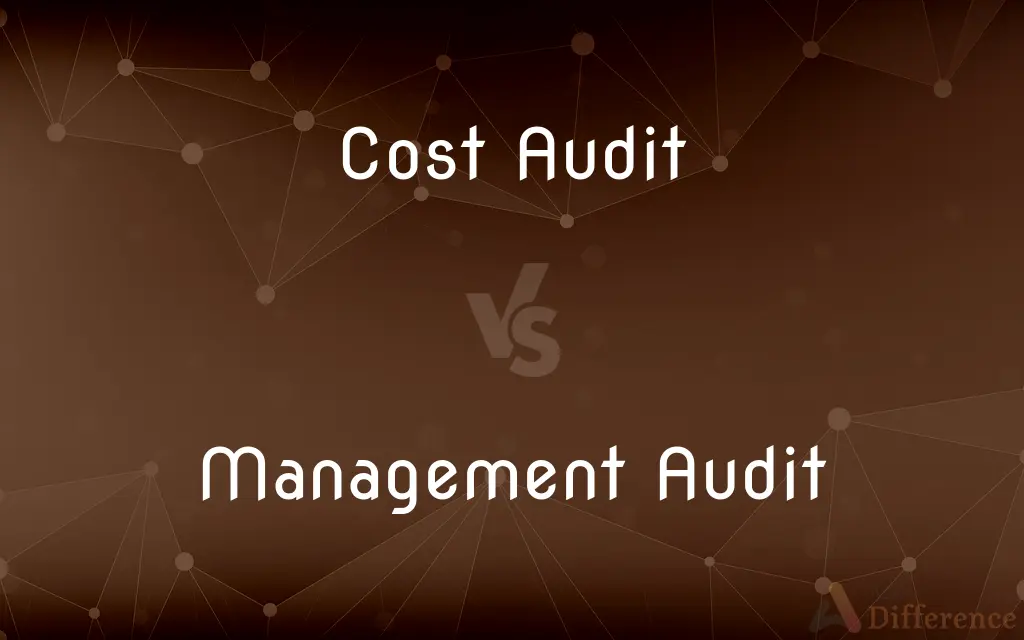Cost Audit vs. Management Audit — What's the Difference?
By Tayyaba Rehman — Published on October 17, 2023
Cost Audit examines financial expenditures, while Management Audit evaluates managerial performance.

Difference Between Cost Audit and Management Audit
Table of Contents
ADVERTISEMENT
Key Differences
Cost Audit is a detailed examination of the costs and expenditures associated with an organization's production or services. It scrutinizes the efficiency, accuracy, and adherence of costing techniques applied by a company. Management Audit, on the other hand, is a comprehensive review of an organization's managerial processes, policies, and performance. It assesses how effectively management achieves its objectives and contributes to the overall success of the business.
Cost Audit emphasizes ensuring that the costs recorded and reported by a company are accurate and have been calculated as per the prescribed standards and procedures. Management Audit, conversely, delves into the quality of managerial decisions, strategies, and the effectiveness of organizational structures in place.
Cost Audit can be mandated by regulatory bodies to ensure transparency and accuracy in financial reporting. It provides stakeholders with a clear understanding of the costs incurred and the pricing of products or services. Management Audit, however, is often voluntary and aims to identify areas of improvement in managerial functions, ensuring that the organization is operating optimally.
Cost Audit focuses predominantly on the financial aspects and the economic efficiency of operations. Its primary concern is the authenticity and accuracy of cost records. Management Audit, in contrast, takes a broader perspective, encompassing both the qualitative and quantitative aspects of management. It critiques the organization's leadership, strategies, and their alignment with business goals.
While Cost Audit is primarily concerned with numerical accuracy and regulatory compliance, Management Audit evaluates the softer aspects of management, including leadership effectiveness, organizational culture, and strategic alignment. Both play crucial roles in ensuring an organization's overall health and success.
ADVERTISEMENT
Comparison Chart
Focus
Financial expenditures
Managerial performance
Objective
Ensure accurate costing
Identify managerial improvements
Nature
Often regulatory-mandated
Typically voluntary
Primary Concern
Authenticity of cost records
Effectiveness of management strategies and decisions
Scope
Economic efficiency of operations
Qualitative and quantitative aspects of management
Compare with Definitions
Cost Audit
A tool to analyze the economic efficiency of business operations.
Implementing the recommendations from the Cost Audit improved the company's profit margins.
Management Audit
An audit that critiques management decisions and their alignment with business goals.
The findings from the Management Audit led to a reshuffle of the executive team.
Cost Audit
A systematic review of cost accounting records for accuracy and compliance.
The company underwent a Cost Audit to ensure its production expenses were accurately reported.
Management Audit
An examination of managerial processes and performance.
The firm's board ordered a Management Audit after a series of strategic blunders.
Cost Audit
An audit that confirms the adherence of costs to established standards.
The Cost Audit highlighted discrepancies in the reported material costs.
Management Audit
A review of the organization's leadership, culture, and strategy.
After the Management Audit, the company revamped its organizational culture.
Cost Audit
An evaluation of an organization's cost structures and cost-saving measures.
The Cost Audit revealed areas where the firm could reduce its overheads.
Management Audit
A tool to identify areas of improvement in managerial functions.
The Management Audit emphasized the need for better communication channels.
Cost Audit
A process mandated by regulatory bodies to ensure transparency in financial reporting.
Due to new regulations, the manufacturing sector had to undergo a mandatory Cost Audit.
Management Audit
A comprehensive assessment of management's effectiveness in achieving objectives.
The Management Audit suggested changes to enhance team collaboration.
Common Curiosities
What's the main focus of Cost Audit?
Cost Audit focuses on examining financial expenditures.
Why might a company undergo a Cost Audit?
To ensure the accuracy of their cost accounting records and compliance with regulations.
What does a Management Audit assess?
It evaluates managerial processes, strategies, and overall performance.
Is Management Audit usually mandatory?
No, Management Audit is typically voluntary.
Who benefits most from a Management Audit?
Organizations seeking to improve managerial effectiveness and decision-making.
Do Cost Audits only focus on numbers?
Primarily, but they also assess compliance with cost standards and procedures.
How frequently should a Management Audit be done?
It varies, but companies may do it periodically or after significant managerial changes.
How does Management Audit impact organizational culture?
It can highlight cultural issues, prompting changes to improve company culture.
Is Cost Audit always required by law?
Not always, but some sectors may have regulatory mandates for Cost Audits.
What's a key outcome of a Management Audit?
Identifying areas of managerial improvement and strategic alignment.
Can Cost Audit be useful for pricing products?
Yes, it provides insights into production costs, aiding in effective pricing.
Can Cost Audit help in cost reduction?
Yes, it can reveal areas where expenses can be minimized.
Who usually conducts a Management Audit?
External consultants or internal teams specializing in organizational assessment.
Do both Cost Audit and Management Audit require external auditors?
Not necessarily. Both can be conducted by internal or external auditors based on company preferences.
Is Cost Audit limited to manufacturing sectors?
No, it's applicable to any sector where cost analysis is relevant.
Share Your Discovery

Previous Comparison
Orc vs. Goblin
Next Comparison
Shallots vs. OnionsAuthor Spotlight
Written by
Tayyaba RehmanTayyaba Rehman is a distinguished writer, currently serving as a primary contributor to askdifference.com. As a researcher in semantics and etymology, Tayyaba's passion for the complexity of languages and their distinctions has found a perfect home on the platform. Tayyaba delves into the intricacies of language, distinguishing between commonly confused words and phrases, thereby providing clarity for readers worldwide.
















































